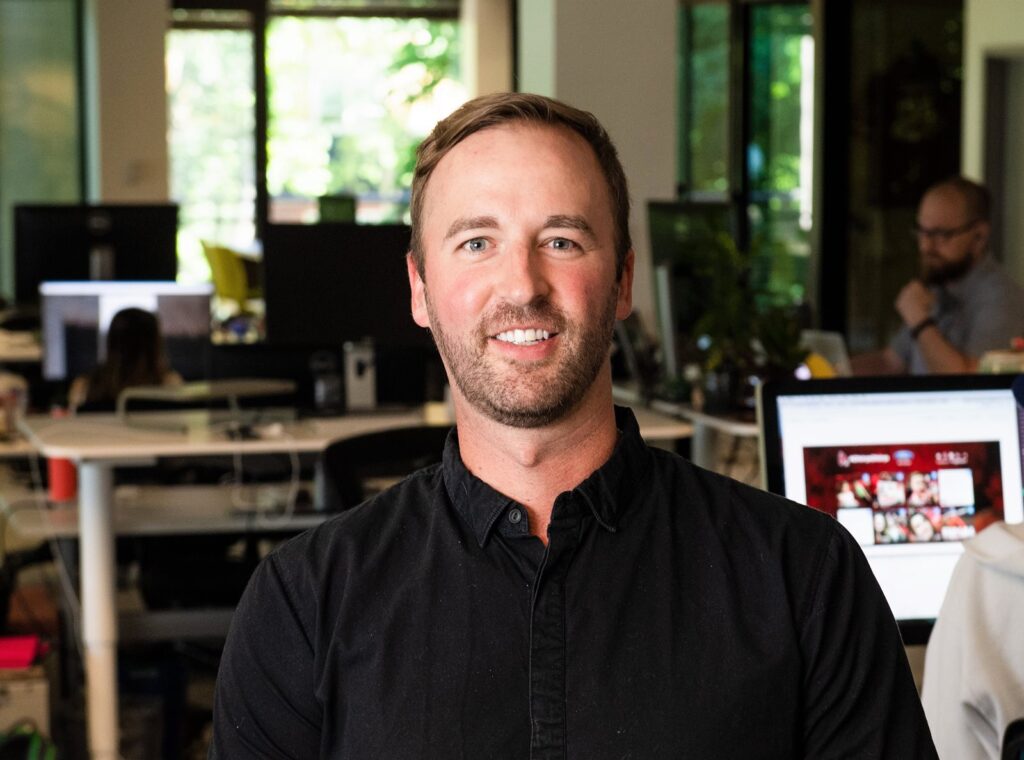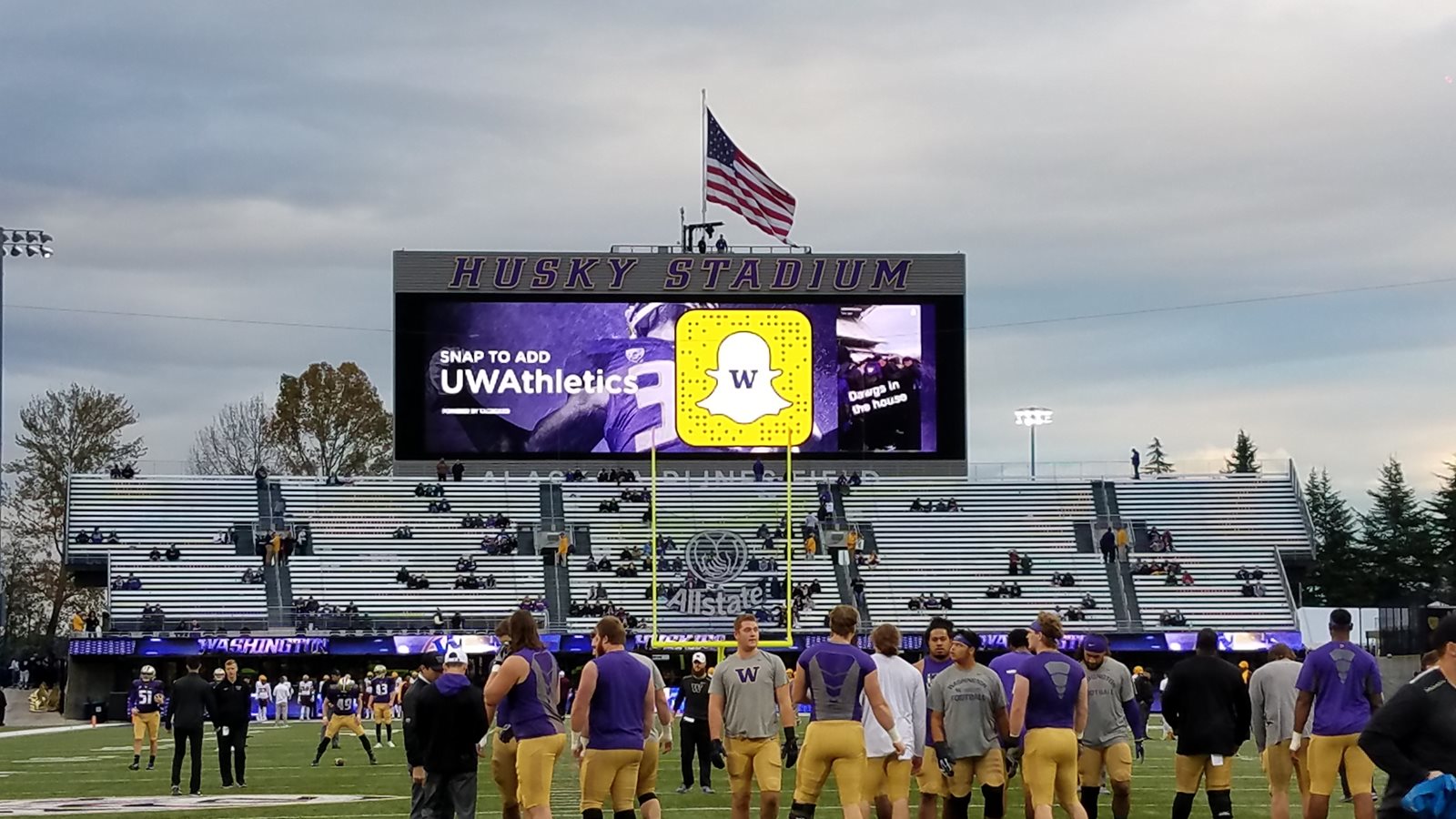
By Douglas Esser
Nathan Peterson graduated from the University of Washington Bothell with a Marketing degree in 2008 during the depths of the Great Recession. He didn’t have a job. But he did have a business plan — “How to monetize social media” — that he had developed as a student exercise. With the idea, his degree and some hard work, Peterson built a career as a social media manager for corporations and an adviser for tech startups. His current position is chief revenue officer at Tagboard, an online platform for sharing social media.
At the UW Bothell 2018 commencement ceremony at Safeco Field, students, family and friends shared pictures of decorated mortarboards, grads in gowns and enthusiastic messages. “You made it!” and “We’re proud of you!” flashed on the Mariners Vision Board and on TV screens around the stadium. Twitter, Facebook, Instagram and Snapchat posts were all tagged with #uwbgrad2018. The Tagboard platform pulled them together and displayed them for all to see.
Peterson said that all the social media content Tagboard collects through hashtags, geotags or keywords reaches more than 1 billion a people a month, via the web, mobile, broadcast and sports venue screens. The 6-year-old subscription service, headquartered in Redmond, works with more than 200 media organizations and more than 175 sports organizations across the globe. Media clients in the Puget Sound region include KING 5 and KOMO 4. National clients include the NFL Network, Fox Sports and Turner Sports. As a lifelong sports fan, Peterson is most proud of partnerships with the Mariners, Seahawks, Sounders and, especially, UW basketball and football.

Peterson was raised in Kirkland and Issaquah by a hard-working single mother and started work as a 15-year-old at a Blockbuster video store. During college, he worked in community relations for the Sonics until the NBA team moved to Oklahoma. At their current home in Issaquah, he and his wife, Rachel Peterson, are raising a son, now 2, and have a second child due in August. Also an entrepreneur, she is a designer and owner of Rachel Brooks Fine Jewelry. “Working hard runs in the family,” he said.
Peterson knew he wanted a career in marketing and said he got the best education for his entrepreneurial spirit at UW Bothell. A transfer student from Bellevue College, he first attended the UW campus in Seattle. An adviser, Connie Pace, made him feel the UW Bothell campus might be a better fit. He also liked what he saw in the School of Business, especially adjunct faculty from the working world.
“I knew I wanted to learn from sharp professionals who had been in the space,” he said. “My professors were industry experts, and my class sizes were smaller,” Peterson said. “For me to be able to learn in a more ‘private-school’ environment for the price of a public school was great.”
A decade after graduating (“seems like just yesterday”), Peterson fondly recalls some the business faculty who had the greatest impact on him: James Reinnoldt (“a well-rounded world view that I always appreciated”), Alan Leong (“a huge influence on who I was as a young entrepreneur), John Rodsett (“quirky, funny, larger than life) and Pete Nye (“the finance guy, one of the best people out there, just a great guy”).
Nye taught one of Peterson’s favorite courses, business negotiations. “I use that knowledge all the time,” he said. Nye also was the adviser for the UW Bothell chapter of the DECA business club. Peterson was president his senior year and competed at competitions in the entrepreneurship category, writing business plans. “How to monetize social media” was an idea for a professional network.
Searching for a job during the recession, Peterson met someone developing a website for the commercial diving industry. The industry needed a way to communicate about jobs, such as the spike in demand for divers on the Gulf Coast after a hurricane. Peterson contributed a social network to the website that divers could use to find work. It also became a platform for advertising. In four months, they had monetized a network for commercial divers around the world, he said.
Peterson then went to Microsoft to build social media plans. “One of the themes of my career: I’ve always been a builder, and I was very lucky social media was just on the rise,” he said.
After a couple of years, he next became the first hire at T-Mobile with a social media title. “Much like a startup, I had to go in, build a plan and pitch it to different divisions — not just my bosses. I got to stand up a division of a company and help it grow,” said Peterson.
In what he said was “arguably the riskiest and craziest move I could have made,” Peterson then left T-Mobile for the challenge of Privateer Holdings, a private equity firm in Seattle that invests in the legal cannabis industry. “I got to experience the ground floor of what it was like to stand up not just brands but an industry in itself,” he said.
For nearly the past two years, Peterson has worked at Tagboard. As chief revenue officer, he leads a team of 13 people responsible for sales, marketing and business development. He also is an adviser to a couple of startups. Eventually he hopes to stand up his own business, possibly involving augmented reality, a “game-changer.”
Peterson has returned to UW Bothell to speak to Reinnoldt’s students. He also is member of the advisory board for the Digital Future Lab (DFL), a commercial game studio on campus.
“I’m so proud to see a program that centers on teaching real-world concepts and that pushes the envelope for diversity and inclusion coming out of the school I attended,” Peterson said. “The DFL is something I’m really excited to contribute to.” In particular, he hopes to boost marketing and sales so the students who go through the DFL program can understand what it’s like to work in a small tech environment.
Peterson is a proud UW alum — “but even more specifically a proud UW Bothell alum,” he said. “I think that I truly wouldn’t be who I am today if I didn’t go to UW Bothell.”



